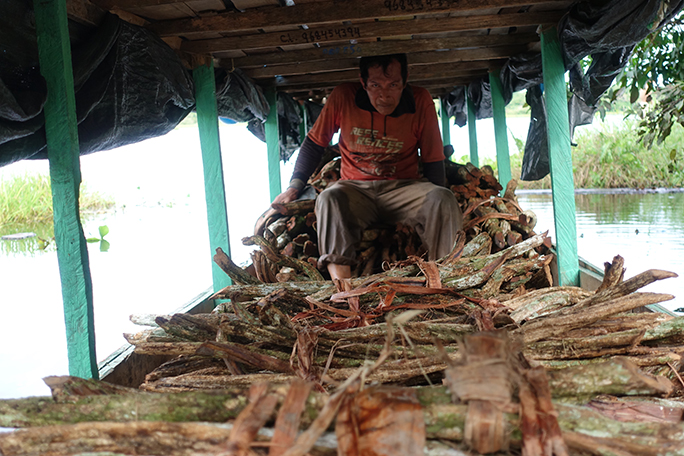Antonio Cauper with boat load of Ayahuasca. Photo by Chris Kilham
The psychedelic Amazonian brew ayahuasca has become globally popular, and this new popularity puts pressure on wild supplies of Banisteriopsis caapi, the forest vine used to make this brew. Over the past several years, many people have speculated about the supply of ayahuasca vine, and many articles have declared the vine endangered. Yet none of this opinion has been based on any surveys or investigations of supply. To gather credible information on the supply of ayahuasca vine in Peru, my colleagues and I conducted research in the Pucallpa, Iquitos, and Rio Tamaya areas of the Peruvian Amazon in January and June of 2018. Our findings have been published in HerbalGram, The Journal Of The American Botanical Council, in November 2018, issue 120. This Medicine Hunter sponsored ethnobotanical research is the first ayahuasca survey to be published in a journal. Our investigations provide some answers and dispel some myths regarding the current state of ayahuasca in Peru.
“Various entities, from academics to media, have speculated on the supply of ayahuasca vine without surveys or real data to support their positions. This ayahuasca field study provides an informed snapshot of the ayahuasca situation in Peru, based on the contributions of a great many people involved with this medicine.” - Chris Kilham
“With the growing interest in and use of the Amazonian vine ayahuasca in the multi-plant preparation of the same name, for ritual and religious purposes in South America and in other countries, it is reasonable and necessary to raise questions regarding the impact that increased demand has on its native plant population. To our knowledge, no previous research has yet been published on this issue. The American Botanical Council is deeply grateful to Chris Kilham for his pioneering efforts to initiate an inquiry on the sustainability of harvesting of wild ayahuasca in its native habitat. This article will very likely become a seminal reference for future publications on this highly compelling and ecologically-relevant subject.” - Mark Blumenthal, Founder & Executive Director, American Botanical Council


